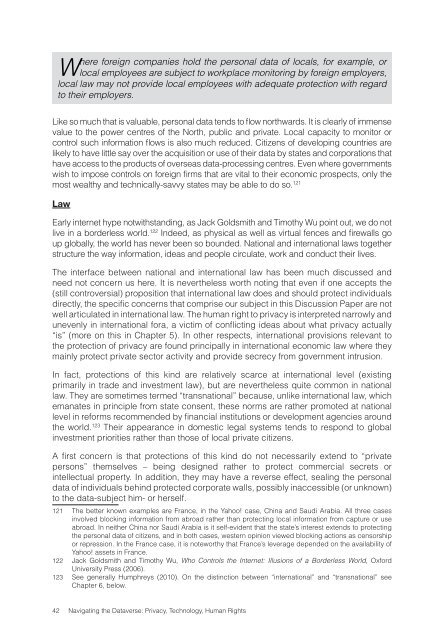Navigating the Dataverse: Privacy, Technology ... - The ICHRP
Navigating the Dataverse: Privacy, Technology ... - The ICHRP
Navigating the Dataverse: Privacy, Technology ... - The ICHRP
You also want an ePaper? Increase the reach of your titles
YUMPU automatically turns print PDFs into web optimized ePapers that Google loves.
Where foreign companies hold <strong>the</strong> personal data of locals, for example, or<br />
local employees are subject to workplace monitoring by foreign employers,<br />
local law may not provide local employees with adequate protection with regard<br />
to <strong>the</strong>ir employers.<br />
Like so much that is valuable, personal data tends to flow northwards. It is clearly of immense<br />
value to <strong>the</strong> power centres of <strong>the</strong> North, public and private. Local capacity to monitor or<br />
control such information flows is also much reduced. Citizens of developing countries are<br />
likely to have little say over <strong>the</strong> acquisition or use of <strong>the</strong>ir data by states and corporations that<br />
have access to <strong>the</strong> products of overseas data-processing centres. Even where governments<br />
wish to impose controls on foreign firms that are vital to <strong>the</strong>ir economic prospects, only <strong>the</strong><br />
most wealthy and technically-savvy states may be able to do so. 121<br />
Law<br />
Early internet hype notwithstanding, as Jack Goldsmith and Timothy Wu point out, we do not<br />
live in a borderless world. 122 Indeed, as physical as well as virtual fences and firewalls go<br />
up globally, <strong>the</strong> world has never been so bounded. National and international laws toge<strong>the</strong>r<br />
structure <strong>the</strong> way information, ideas and people circulate, work and conduct <strong>the</strong>ir lives.<br />
<strong>The</strong> interface between national and international law has been much discussed and<br />
need not concern us here. It is never<strong>the</strong>less worth noting that even if one accepts <strong>the</strong><br />
(still controversial) proposition that international law does and should protect individuals<br />
directly, <strong>the</strong> specific concerns that comprise our subject in this Discussion Paper are not<br />
well articulated in international law. <strong>The</strong> human right to privacy is interpreted narrowly and<br />
unevenly in international fora, a victim of conflicting ideas about what privacy actually<br />
“is” (more on this in Chapter 5). In o<strong>the</strong>r respects, international provisions relevant to<br />
<strong>the</strong> protection of privacy are found principally in international economic law where <strong>the</strong>y<br />
mainly protect private sector activity and provide secrecy from government intrusion.<br />
In fact, protections of this kind are relatively scarce at international level (existing<br />
primarily in trade and investment law), but are never<strong>the</strong>less quite common in national<br />
law. <strong>The</strong>y are sometimes termed “transnational” because, unlike international law, which<br />
emanates in principle from state consent, <strong>the</strong>se norms are ra<strong>the</strong>r promoted at national<br />
level in reforms recommended by financial institutions or development agencies around<br />
<strong>the</strong> world. 123 <strong>The</strong>ir appearance in domestic legal systems tends to respond to global<br />
investment priorities ra<strong>the</strong>r than those of local private citizens.<br />
A first concern is that protections of this kind do not necessarily extend to “private<br />
persons” <strong>the</strong>mselves – being designed ra<strong>the</strong>r to protect commercial secrets or<br />
intellectual property. In addition, <strong>the</strong>y may have a reverse effect, sealing <strong>the</strong> personal<br />
data of individuals behind protected corporate walls, possibly inaccessible (or unknown)<br />
to <strong>the</strong> data-subject him- or herself.<br />
121 <strong>The</strong> better known examples are France, in <strong>the</strong> Yahoo! case, China and Saudi Arabia. All three cases<br />
involved blocking information from abroad ra<strong>the</strong>r than protecting local information from capture or use<br />
abroad. In nei<strong>the</strong>r China nor Saudi Arabia is it self-evident that <strong>the</strong> state’s interest extends to protecting<br />
<strong>the</strong> personal data of citizens, and in both cases, western opinion viewed blocking actions as censorship<br />
or repression. In <strong>the</strong> France case, it is noteworthy that France’s leverage depended on <strong>the</strong> availability of<br />
Yahoo! assets in France.<br />
122 Jack Goldsmith and Timothy Wu, Who Controls <strong>the</strong> Internet: Illusions of a Borderless World, Oxford<br />
University Press (2006).<br />
123 See generally Humphreys (2010). On <strong>the</strong> distinction between “international” and “transnational” see<br />
Chapter 6, below.<br />
42 <strong>Navigating</strong> <strong>the</strong> <strong>Dataverse</strong>: <strong>Privacy</strong>, <strong>Technology</strong>, Human Rights
















